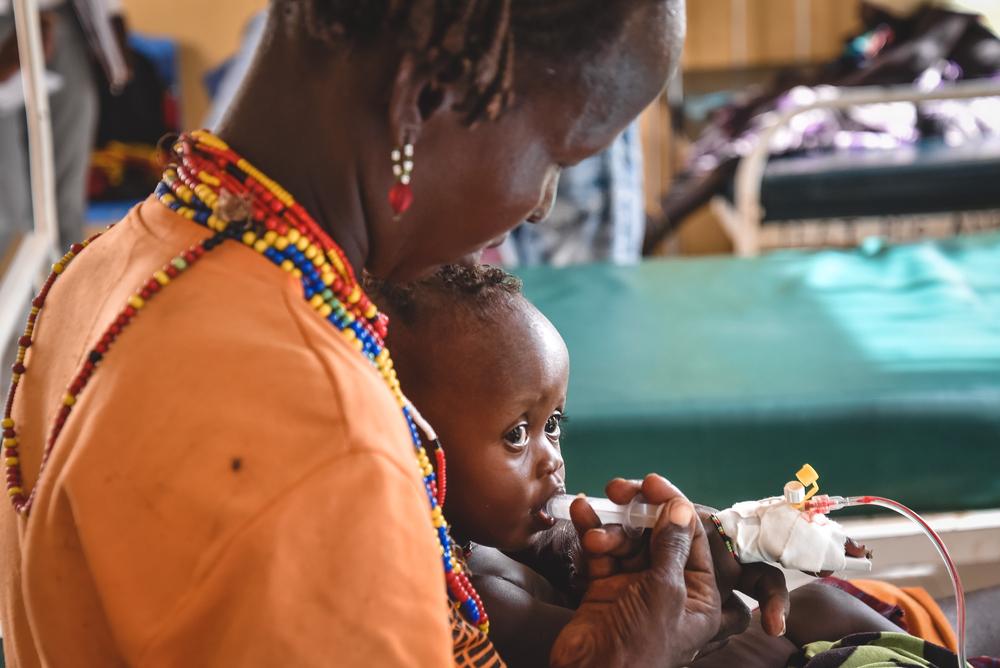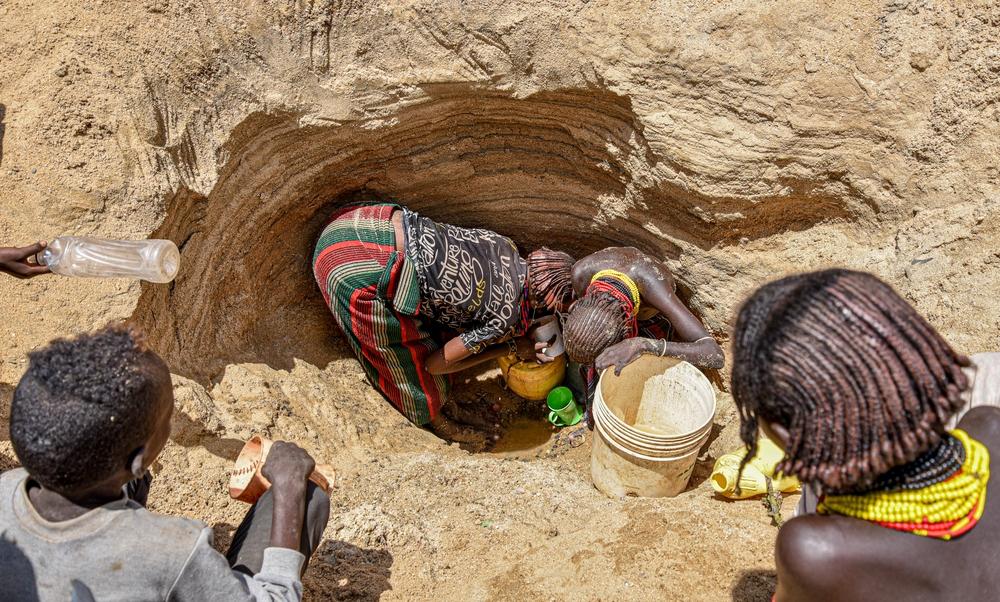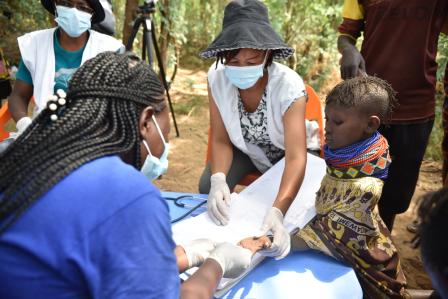Kenya: Urgent humanitarian response required now to address rising malnutrition cases

A mother feeds her nine month old daughter Egura milk through a syringe at the Inpatient Therapeutic Feeding Center(ITFC) in Illeret Health Center. Egura was admitted with severe acute malnutrition and since her mother has no breastmilk due to lack of food, has been unable to breastfeed for days. Kenya, 2022. © MSF/Lucy Makori
In north-eastern parts of Kenya, an ongoing drought rages following three consecutive seasons of failed rains, making an already dire food insecurity situation worse. Marsabit County is now at a level three crisis phase of high or above-usual rates of acute malnutrition. If the medical and humanitarian assistance doesn’t improve, this situation may continue to September 2022. Despite the prolonged drought crisis, the region has seen underinvestment in nutrition from the county and national governments.
60% of livestock lost
In the area of Illeret, malnutrition cases have been increasing in households due to people drinking less milk because of the health deterioration and deaths of livestock of this pastoralist community.
Telite, a 26-year-old mother of six from Lomadang village, has twin boys who are still breastfeeding and currently in the Doctors Without Borders / Médecins Sans Frontières (MSF) and partners nutrition program with moderate and severe acute malnutrition. Her breastmilk is insufficient as she hardly gets anything to eat.
“We had 20 cattle and sheep too,” Telite says, “but all have died. We collected the carcases near the road to be burnt.” Pasture and water resources have declined, causing long distance trekking to find grazing areas for livestock and for domestic use. Households barely have a meal per day. “I now collect firewood for sale near Ethiopia,” says Telite. “I also fetch water from the well and sell it. If I get money, I buy flour for porridge, but sometimes when I do not sell, we just sleep hungry.”
The situation is worsened by reduced access to food in the market and decline in trade, as prices of groceries have shot up by 25 to 50 per cent. This lack of food has led to families sharing the nutrition supplements given to malnourished children.

Women fetch water in one of the shallow wells along a dry river bed in Illeret. The ravaging drought has led to a water shortage in the region forcing residents to look for alternative water sources, unsafe for human consumption. Kenya, 2022. © MSF/Lucy Makori
A worsening malnutrition crisis
In February 2022, Doctors Without Borders carried out an assessment in five sub-counties of Marsabit. North Horr sub-county, specifically in Illeret, presented the worst food security situation and the highest number of malnourished children. A mass screening done by UNICEF in Marsabit, also in February, showed a critical global acute malnutrition rate of 23.3 per cent. Eleven malnourished children who were patients in the program died between mid-February to mid-March.
As the malnutrition numbers rose in Illeret, management of patients in need of treatment at the health center has been a challenge. The nearest referral facility is five hours drive away, with barely a public transport vehicle, exacerbating the impacts of limited medical staff and drugs in public health facilities.
The Ministry of Health and partners conducted outreach activities to support the integrated management of acute malnutrition in some sub counties. These activities could not be sustained regularly, reducing identification of malnourished children and follow-ups in the community.
More funding and coordination are needed to be able to meet people's critical needs and address malnutrition. Mobile outreach needs to offer regular nutrition assessment and support. In the past, logistical and human resource challenges meant outreach clinics were held only once or twice a month, undoing the treatment progress of malnourished children and follow-ups.Edi Atte, Country Director
Doctors Without Borders response
Doctors Without Borders has been working with the Ministry of Health and partners to strengthen the medical component of nutrition management activities in Illeret. Doctors Without Borders teams support screening, diagnosis and management of acute malnourished children. The active case finding and surveillance have increased the number of children who have access to this care.
Since we started our intervention in March, there has been an increase in admissions of children with acute malnutrition and children not responding to treatment. We enhanced referrals to the stabilisation centre in Illeret. This has saved lives.Edi Atte, Country Director
Doctors Without Borders also helped adapt the inpatient department of Illeret Health Centre to a 10-bed inpatient therapeutic feeding centre. Mothers in the feeding centre also receive at least three meals a day, to enhance their lactation.
What must be done NOW?
It’s now raining in the region and food distribution is happening. However, there is still a critical need for consistent, quality and adequate amount of food distribution for households. Long-term solutions must be found to help people access water, an issue which continues to impact children’s health.
“Doctors Without Borders urgently calls for sustained food distribution to all households in Illeret and increased human resources for Illeret Health Center,” says Edi Atte. “Donors need to act now to avert humanitarian catastrophes that will continue if more is not done quickly.” .
